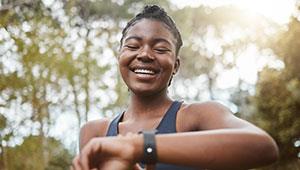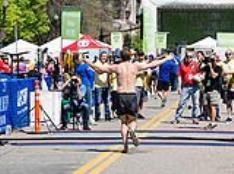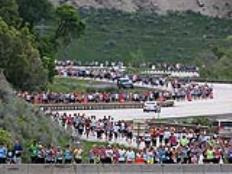Every Run is a Learning Experience
Ward is also an adjunct lecturer in statistics at BYU and believes his analytical approach to running has paid dividends. And while “you don’t have to run a regression on every training run,” tracking your resting heart rate, weekly mileage, how runs feel day-to-day and what you’re eating can help. Noting changes and patterns may assist your training, even if you don’t know Pheidippides from Pythagoras.
If you have better runs after eating certain foods, take note of that. If you discover those neighborhood hills feel a bit easier after strength training, keep that routine in your repertoire. If you find that an extra hour of sleep means you have a bit more energy for tempo runs, adjust your bedtime accordingly. Noticing and adapting to little things may have a big payoff.
“I approach every marathon as another data point to learn from,” Ward says. “Like, how do I respond to hills or heat or nutrition? I read into all these cues.”
Find Your Routine
When he’s training, Ward follows the same basic routine. Having a consistent schedule makes workouts an integral part of your day, rather than something you have to try to fit into your busy life.
For Ward, the day begins early, before sunrise, with a focus not on pace but peace. “I have a little spiritual prep to start my day,” he says. “I like to read some scripture when it’s dark and quiet, and prayer time sets my mind right.”
His first run of the day follows, in the crisp morning air as the sun rises over the Rocky Mountains outside his Provo, Utah, home. He returns as his kids awake (“they’re usually climbing and jumping all over me as I’m stretching”) and his wife cooks a breakfast that includes eggs and lots of vegetables. After breakfast, he enjoys family time, a light lunch, a quick nap with his kids, and prepares for an afternoon run and weight-lifting session that includes “heavy squats and lunges” to strengthen his legs.
His day ends with a family dinner and cross-training. “I like to ride the exercise bike while I watch something on TV.”
Your Stomach is as Important as Your Legs
Ward is, not surprisingly, a stickler for nutrition. Though he enjoys food, he eats to fuel his body for performance, which means he’s wary of what he consumes. “As I get older and my metabolism is slowing down, I really focus on getting all the nutrition and energy I need without the extra calories,” he says. “Even when I’m running 120 miles a week, I’ve learned that I still can put weight on if I’m not eating right.”
His meals include a balance of carbohydrates for energy and protein to help heal damaged muscles, especially following harder workouts. He also focuses on hydrating before, during and after runs, a lesson he learned during the Trials. Ward lost 15 pounds and 2 gallons of water under the Los Angeles heat. “I learned that when conditions are that hot, I need more fluids. I learn a bit about how my body responds to every race.”
He also supplements his diet with products from the sports nutrition company GLUKOS (which sponsors him), including gels during long runs and protein bars afterward.
- 2
- of
- 3
Get ACTIVE on the Go


Couch to 5K®
The best way to get new runners off the couch and across the finish line of their first 5K.
Available for iOS | Android







Discuss This Article